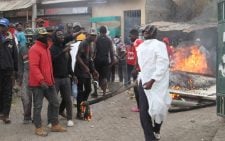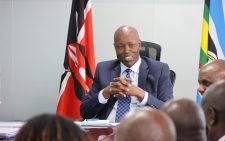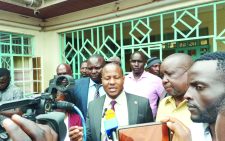Uhuru ready to revive stalled process to end DRC’s warfare

Former President Uhuru Kenyatta says he is ready to revive the stalled Nairobi Peace Process to end the violence that broke out in the Eastern Democratic Republic of Congo (DRC) last month.
Uhuru noted that the peace process which he was appointed as the facilitator, remains a critical framework for dialogue and conflict resolution in the troubled eastern DRC.
In a statement read on his behalf by his spokesperson Kanze Dena Mararo, the former Head of State emphasised that the recent resurgence of hostilities in the region highlights the urgent need for renewed political will, regional co-operation and sustained support for peace efforts to avoid further deterioration of the security situation in the area.
Two-day summit
Uhuru’s remarks come at the onset of a two-day summit to discuss the situation in DRC that brings together presidents from Southern African Development Community (SADC) and the East African Community (EAC) countries that kicks off today in Dar es Salam, Tanzania.
EAC chairperson and Kenyan President William Ruto and his SADC counterpart, Zimbabwe’s Emmerson Mnangagwa have convened the meeting.
The highlight of the summit will be the attendance of DRC President Felix Tshisekendi and his Rwanda counterpart Paul Kagame.
While DRC has been blaming Rwanda Defence Force (RDF) for supporting the M23 fighters, Rwanda on the other hand accused DRC of supporting the Democratic Forces for the Liberation of Rwanda (FDLR) resulting in the violence that has rocked the border region of both countries.
The violence in DRC that has been ongoing for over two decades escalated at the beginning of 2025 with deadly clashes being reported in the Eastern city of Goma, North Kivu province, where about 900 people were killed and hundreds more displaced.
Eastern DRC is rich in natural resources and has attracted over 120 armed rival groups including the M23 rebels who have been competing to control the minerals comprising tin, gold, tantalum and tungsten as the Armed Forces of the DRC (FARDC) try to suppress the insurgencies.
Precarious situation
Humanitarian agencies operating in Kivu said that the displaced people are living in extremely precarious situations as they flee into already overcrowded camps for internally displaced people (IDPs) in and around the city of Goma.
“The impact of the recent escalation across eastern DRC has been devastating for the civilian population. Many of those who have been displaced in the past month have already fled violence multiple times. Whole generations in eastern DRC have known nothing but conflict, and their needs have been utterly neglected,” Norwegian Refugee Council said in a statement on Wednesday.
NRC was reacting after the Rwanda-backed M23 rebels declared a ceasefire in the region citing deteriorating humanitarian situation.
“The Alliance Fleuve Congo (AFC/M23) hereby informs the public that, in response to the humanitarian crisis caused by the regime in Kinshasa, it declares a ceasefire starting February 4 for humanitarian reasons,” M23 said in a letter posted on X.
According to Uhuru, the Nairobi Peace process was initiated by the EAC to counter the escalating insecurity challenges in the Eastern DRC in 2021/22
“This process was formally established during the 22nd Ordinary Summit of the EAC on the 22nd of July 2022 and it represents a critical diplomatic and military effort to bring peace and stability to the region,” Uhuru stated.
Having been appointed as the Facilitator of the Process, Uhuru was tasked with overseeing the creation of the inter-Congolese dialogue that was to be structured around two key elements – political dialogue and military intervention.
Kenya’s fourth President clarified that the political aspect focused on engaging all stakeholders including armed groups, political factions, civil society and regional partners in an inclusive conversation aimed at resolving the conflict and fostering long-term peace.
On the other hand, the military element involved the deployment of the EAC Regional Force to provide peacekeeping and peace enforcement support complementing the political dialogue efforts.
Diplomatic engagement
Uhuru said that he embarked on conducting extensive diplomatic engagements meeting with political, civil and military stakeholders where in June 2023, the region inched closer to attaining peace and security.
“Key initiatives included multiple targeted discussions with armed groups including the M23, confidence building measures of the various civil rights and women groups and the organisation of several high-level conferences to resolve tensions and identify pathways to peace,” Uhuru added.
The efforts, the former President noted, led to a noticeable reduction in hostilities and a return of displaced persons and significant withdrawals by armed groups from strategic areas in North Kivu.














